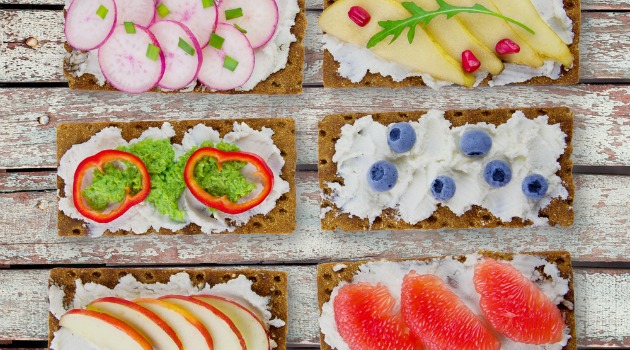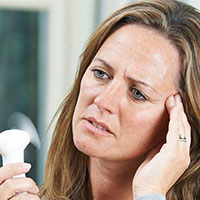Good Morning Friday 19th April 2024

Menopause diet - the best foods to help symptoms

If you've experienced some of the menopause's most common symptoms, you'll know just how unpleasant they can be. With many women experiencing hot flushes, weight gain and plummeting energy levels, it's safe to say that the menopause is an inevitable buzzkill. But don't lose hope just yet; good health starts in the kitchen and making informed decisions about your diet could help to ease some of your symptoms. From what to eat to the foods to avoid, here's our guide to menopause and diet.
Get more health news delivered straight to your inbox...
Expert recommendations from Suzi Grant
Finding out what works for you is key, but we highly recommend watching this video by blogger, author and broadcaster Suzi Grant on her advice on foods to eat to combat menopause symptoms like sluggishness, poor skin and weight gain. Her first tip is a little surprising - but Suzi swears by it.
The menopause diet - 9 healthy eating tips
1. Cut down on sugar
You've probably heard it before, but now is as good a time as any to start cutting back on those sweet treats. We know it's not always easy to resist a slice of cake, but making a conscious effort to reduce your intake of sugar can decrease your risk of obesity, not to mention the health benefits of cutting the risk of heart disease and diabetes.
If you're already tired from lack of sleep - thanks for that, menopause - or are experiencing a dip in energy levels in general, the rollercoaster ride of sugar highs and lows isn't going to help. By opting for healthier snacks, you can help maintain blood sugar levels and limit the menopause weight gain caused by hormonal changes.
If you're wondering where to start, there are a few fairly painless ways to reduce sugar in your diet:
- Read the label - the first step to eliminate hidden sugar is to read the lables on everything you buy. It shows up in many products you wouldn't expect. If you notice that sugar is one of the first ingredients listed in a jar of spagehetti sauce or box of crackers, put it down and choose a brand with less sugar. Or you could avoid processed foods altogether and make it yourself.
- Cut back on sugar-filled drinks - soda and other sugary pop drinks are obvious culprits but even drinks that may seem healthy are often filled with sugar. Always read the lable to make sure that "healthy fruit drink" isn't filled with sugar and opt for lighter drinks such as sparkeling waters and herbal or fruit teas.
- Eat food as nature made it - the closer your food is to its natural state, the healthier it usually is. If you're craving something sweet try eating a piece of fruit first. It might not stop you from eating cakes and candy completely but exchanging a few of those snacks for something more healthy can cut the amount of sugar you eat every day.
In you're craving sugar, include a small amount of complex carbohydrates such as grains and wholemeal bread in your diet. In addition to curbing those cravings complex carb can help you feel fuller for longer, so you may find yourself snacking less. It is also thought that a high fibre diet may help to stabilise oestrogen levels which will ease your menopause symptoms.

2. Limit your meat intake and eat more oily fish
Aside from the physical symptoms, the menopause can also affect our general health too, including triggering high cholesterol levels. It's wise to limit your intake of red meat due to how rich it is in saturated fat.
Instead, focus on a protein-rich diet from other sources and choose lean meats that are rich in vitamin B12. Turkey and chicken are two versatile options that contain mood-lifting tryptophan, which could help to regulate menopausal mood swings.
Adding omega-3 rich foods to your diet such as oily fish, including salmon, tuna and sardines, is another way to eat healthier. If you can't get fresh fish, remember to check the salt content in the tinned variety as it is often quite high. Too much salt in your diet could bring on hot flushes, night sweats and contribute to dry skin. Not sure what to cook? See gransnetters' favourite family-friendly fish and seafood recipes to get you started.
If you're vegetarian, mood-boosting amino acids can also be found in foods such as tofu, cheese, eggs, pumpkin seeds, soya products, beans and lentils. These delicious vegetarian recipes are great if you need some supper inspiration.
If you're not a vegetarian, try going meat-free day once a week. It's an easy way to incorporate more vegetables in your diet.
3. Reduce how much caffeine you have
Sleep problems can often be a plaguing symptom of the menopause but there are many ways you can get a good night's rest. One way to tackle insomnia is to limit the amount of caffeine you take in during the day. When you do drink caffeine, drink it earlier in the day. Have your last cup of tea or coffee long before bed to lessen its effect on your sleep patterns.
If you must have your morning kick, consider swapping coffee or tea for antioxidant-rich matcha green tea for a slow release boost with less of the jitters.
Tea and coffee are not the only ways we consume caffeine. Chocolate provides a big kick, so do many carbonated drings including sodas and energy drinks. Check your medicines, too. Many contain caffeine. For those of you who are partial to a bar (or two) of dark chocolate, it's best to limit your intake or indulge earlier in the day so that the caffeine it contains doesn't further disrupt your sleep.

4. Opt for iron-rich foods
Many women going through the menopause experience iron deficiency, which can affect your energy level, your skin and nails, and can even contribute to hair loss. You can tackle this by adding iron to your diet.
It's no secret that including leafy green vegetables in your diet is one of the best ways to make sure you get the nutrients you need, and adding these to meals is an easy way to be a little healthier.
These greens are all full of fibre, vitamins and minerals:
- Kale
- Spinach
- Broccoli
- Cabbage
- Romaine lettuce
Beans, chickpeas, pumpkin seeds and dried fruit are also high in iron and other essential vitamins.
Join over a quarter of a million monthly users on Gransnet...
5. Go for wholemeal or wholegrain carbs
When we're tired, irritable or even just feeling a little down, it's frighteningly easy to reach for the biscuit tin. But try to resist - it won't make you feel any better. Your body's changing hormones may have thrown the diet rule book out the window, but eating right is crucial to feeling better during menopause. Switching to wholemeal or wholegrain carbs, such as brown rice, can help to keep the insidious 'middle-aged-spread' at bay and boost energy levels.
Many whole grain foods are low GI, which means they are high in dietary fibre and absorbed more slowly. This means that we stay fuller for longer, which can help weight loss, reduce blood sugar levels and lower the risks of heart disease and diabetes.
They are also high in vitamins and minerals including thiamin, riboflavin, niacin, folate, iron, magnesium and selenium.
Include more wholegrains in your diet with these easy substitutions:
- Use wholewheat flour for baking. If you're not sure how this will affect your recipe, try half wholeweat flour and half plain flour.
- Eat popcorn as a snack instead of crackers or crisps. Be careful not to flavour with too much butter!
- Try quinoa instead of rice or mix it half and half.
- Add wholegrains like barley, bulger wheat and brown rice to soups and stews

6. Hotter than a jalapeño - the devils that increase menopause symptoms
Menopause symptoms are bad enough, let alone when you add things to your body to intensify them. If you want to reduce menopause bloating or achieve a weight loss goal, here are the things that are a definite no-no:
- Spicy foods - they raise your temperature and can trigger hot flushes so if you must eat chillies, be sure to eat them earlier in the day to decrease the chance of those dreaded night sweats.
- Alcohol - this can also trigger hot flushes as well as dehydrating you, which can contribute to mood swings and menopause weight gain.
- Processed and fast food - usually high in salt or sugar, which can make you retain water and feel bloated. The NHS advises that losing excess weight can reduce the severity of your symptoms and frequent consumption of processed food can increase the likelihood of obesity.
7. Could soy be the answer?
Although limited research has been done on this subject, it is believed that isoflavone (a phyto-oestrogen), found in soy products, could help lower cholesterol and ease hot flashes and night sweats.
The jury's still out, but phyto-oestrogens are believed to act in a similar way to oestrogen, and can potentially help to balance hormones out.
Foods that are high in soya include:
- Edamame - nothing beats the original source. Soybeans are high in protien and contain no colesterol. Lightly boiled fresh soybeans can be a snack or served as part of a meal. You can also find them in the frozen food aisle.
- Soya milk - an excellent source of protein and B vitamins. This is also a good milk substitute if you are lactose intollerant. It can be used the same way you would use milk, as a beverage or in cooking.
- Soy nuts - whole soybens soaked in water, then roasted. This snack is high in protein and isoflavones and is similar to peanuts.
- Tempeh - made from fermented soybeans, Tempeh has a smokey or nutty flovour. It can be added to soups and cassaroles.
- Tofu - soya bean curd is rich in B vitamins and protien and low in sodium. It comes in soft and firm varities. Firm tofu can be used in stir fries, soups, on the grill of fried. Soft tofu works well in pureed and blended dishes.
8. Eat foods to help menopause bone health
Falling levels of oestrogen means our bones are less protected, therefore it is important to do what you can to keep them strong and reduce bone loss. As well as staying active to strengthen your bones, making sure that you include calcium in your diet is key to eating right during menopause.
Great sources of calcium include:
- Milk, cheese and other dairy products (preferably low-fat)
- Almonds and other nuts
- Figs
- Leafy green vegetables
- Sardines
- Tofu
- Soya beans

When it comes to essential vitamins for menopause, vitamin D helps with the loss of bone density that can occur during the menopause, and therefore it shouldn't be overlooked. It's important that you speak to your doctor if you're worried about vitamin D deficiency, and they may recommend taking a supplement to boost your levels of the vitamin.
Along with sunlight, the following are great source of vitamin D:
- Oily fish
- Egg yolks
- Red meat (eat in moderation due to its high levels of saturated fat)
- Liver
- Fortified breakfast cereals
9. Focus on fruit and vegetables
We've all heard that we should try to fit '5 a day' into our diet, but ensuring that you get plenty of fruit and vegetables during the menopause should be a priority. Some surveys have indicated that women aged between 50 to 64 don't get all the fruit and veg they need, but as a source of multiple vitamins and minerals, they are key to leading a healthy lifestyle.
Adding extra fruit and vegetables into your diet can help minimize weight gain and provide the vitmins and minerals you need to stay healthy.
If you don't already eat vegetables, you can quickly get your five (or 7 a day) with a few small changes:
- Make vegetable based soups - cook until soft and puree them or simply dice your choice of vegetables and add them to any soup. Not only is this a way to quickly multiply the number of veggies you're eating, it's also a good way to use up the vegetables that accumulate at the bottom of the fridge.
- Substitute vegetable for pasta - noodles and ribbons made from vegetables can be sustituted for pasta. If you don't have time or the equipment to make your own, you can buy spirilized vegetables in most grocery stores.
- Add vegetables to sauces - simply grate or puree your choce of vegetables into your favourite sauces for a quick vitamin kick.
- Add fruit and vetetables into smoothies - frozen fruit work well, as do cucumbers and leafy greens.
- Grate vegetables into savory dishes - do you have a grandchild who refuses to eat vegetables? This is a clever trick to add vegetables to the diets of those who don't like them. Simple grate a corgette or carrot, or two into anything you make with ground mince. It's a healthy addition to dishes like spag bog, shepards pie and chilli.
Suzi Grant is a self-confessed, reformed 'chain-smoking and heavy-drinking tv reporter'. When her mother died of a heart attack at 63, she decided a change was in order so she retrained as a nutritionist. Suzi has written three books including Alternative Ageing which is available online and from all good bookshops.
As with any menopause diet plan, discuss further with your GP if you're unsure.
Disclaimer: The information on our diet and fitness pages is only intended as an informal guide and should not be treated as a substitute for medical advice. Gransnet would urge you to consult your GP before you begin any diet if you're concerned about your weight, have existing health conditions and/or are taking medication.
Images: Shutterstock



